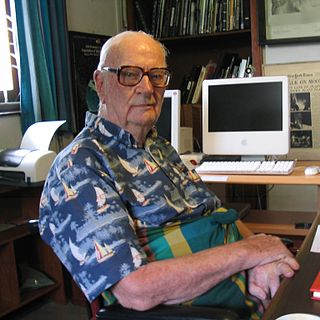
Hard science fiction is a category of science fiction characterized by concern for scientific accuracy and logic. The term was first used in print in 1957 by P. Schuyler Miller in a review of John W. Campbell's Islands of Space in the November issue of Astounding Science Fiction. The complementary term soft science fiction, formed by analogy to the popular distinction between the "hard" (natural) and "soft" (social) sciences, first appeared in the late 1970s. Though there are examples generally considered as "hard" science fiction such as Isaac Asimov's Foundation series, built on mathematical sociology, science fiction critic Gary Westfahl argues that while neither term is part of a rigorous taxonomy, they are approximate ways of characterizing stories that reviewers and commentators have found useful.

William Olaf Stapledon was a British philosopher and author of science fiction. In 2014, he was inducted into the Science Fiction and Fantasy Hall of Fame.
Edward Groff Conklin was an American science fiction anthologist. He edited 40 anthologies of science fiction, one of mystery stories, wrote books on home improvement and was a freelance writer on scientific subjects as well as a published poet. From 1950 to 1955, he was the book critic for Galaxy Science Fiction.

Scientific romance is an archaic, mainly British term for the genre of fiction now commonly known as science fiction. The term originated in the 1850s to describe both fiction and elements of scientific writing, but it has since come to refer to the science fiction of the late nineteenth and early twentieth centuries, primarily that of Jules Verne, H. G. Wells and Arthur Conan Doyle. In recent years the term has come to be applied to science fiction written in a deliberately anachronistic style as a homage to or pastiche of the original scientific romances.

Peter Schuyler Miller was an American science fiction writer and critic.

Farewell, Fantastic Venus is a 1968 American science fiction anthology edited by Brian Aldiss and Harry Harrison. An abridged version was published in the same year under the title All About Venus. It was first published as a direct response to the information returned from the first space probes sent to Venus, especially the first atmospheric probe to return data, Venera 4. The first data was not returned from the surface until Venera 7 successfully landed in 1970.
Galaxy novels, sometimes titled Galaxy Science Fiction Novels, were a series of mostly reprint American science fiction novels published between 1950 and 1961.
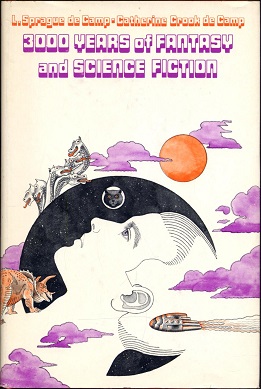
3000 Years of Fantasy and Science Fiction is an anthology of fantasy and science fiction short stories, edited by American writers L. Sprague de Camp and Catherine Crook de Camp. It was first published in both hardcover and paperback by Lothrop Lee & Shepard in 1972. It was the first such anthology assembled by the de Camps, preceding their later Tales Beyond Time (1973).
The Road to Science Fiction is a series of science fiction anthologies edited by American science fiction author, scholar and editor James Gunn. Composed as a textbook set to teach the evolution of science fiction literature, the series is now available as mass market publications. The six-volume set collects many of the most influential works of the genre. It was published originally by Signet and then by White Wolf Games Studio. Volumes 1 through 4 are currently being reprinted in paperback format by the company Scarecrow Press.

Beyond Time and Space is an anthology of science fiction stories edited by American writer August Derleth. It was first published by Pellegrini & Cudahy in 1950. Several of the stories had originally appeared in the magazines The Century, The Atlantic Monthly, The Strand, Blue Book, Blackwood's Magazine, Weird Tales, Amazing Stories, Astounding Stories, Maclean's, The American Legion Magazine and Startling Stories. A heavily abridged paperback edition was issued by Berkley Books in 1958.

The Other Side of the Moon is an anthology of science fiction stories edited by American writer August Derleth. It was first published by Pellegrini & Cudahy in 1949. Many of the stories had originally appeared in the magazines The Graphic Christmas, Astounding Stories, Thrilling Wonder Stories, Wonder Stories, Weird Tales, Blue Book, Planet Stories, The Saturday Evening Post, Collier's Weekly or in the collections The Fourth Book of Jorkens by Lord Dunsany and The Witchfinder by S. Fowler Wright.

The Sleeping and the Dead is an anthology of fantasy and horror stories edited by American writer August Derleth. It was first published by Pellegrini & Cudahy in 1947. Many of the stories had originally appeared in the magazines The London Mercury, Weird Tales, Scribner's, Dublin University Magazine, Unknown, Esquire, The Bellman, Vanity Fair and Black Mask. An abridged edition was published by Four Square Books in 1963 under the same title.
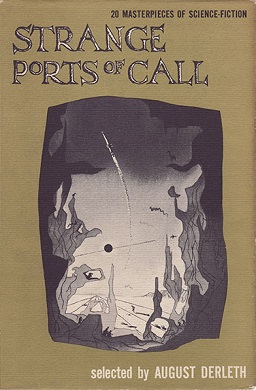
Strange Ports of Call is an anthology of science fiction stories edited by American writer August Derleth. It was first published by Pellegrini & Cudahy in 1948. The stories had originally appeared in the magazines Blue Book, Amazing Stories, Weird Tales, Science and Invention, Astounding Stories, Coronet, The New Review, The Black Cat, Thrilling Wonder Stories, Wonder Stories, Comet, The Saturday Evening Post, Collier's Weekly and Planet Stories.

The Best Science Fiction Stories: 1950 is a 1950 anthology of science fiction short stories edited by Everett F. Bleiler and T. E. Dikty. An abridged edition was published in the UK by Grayson in 1951 under the title The Best Science Fiction Stories. The stories had originally appeared in 1949 in the magazines Astounding, The Saturday Evening Post, Fantasy and Science Fiction, Fantastic Adventures, Maclean’s, Thrilling Wonder Stories, Blue Book and Startling Stories. The anthology was later combined with the 1949 volume and reissued as Science Fiction Omnibus.
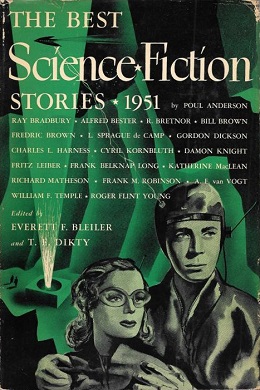
The Best Science Fiction Stories: 1951 is a 1951 anthology of science fiction short stories edited by Everett F. Bleiler and T. E. Dikty. An abridged edition was published in the UK by Grayson in 1952 under the title "The Best Science Fiction Stories: Second Series". Most of the stories had originally appeared in 1950 in the magazines Fantasy and Science Fiction, Worlds Beyond, Astounding SF, Other Worlds, Galaxy Science Fiction, Fantastic Story Quarterly, Startling Stories, Collier's Weekly, Thrilling Wonder Stories and Weird Tales.

The Best Science Fiction Stories: 1953 is a 1953 anthology of science fiction short stories edited by Everett F. Bleiler and T. E. Dikty. An abridged edition was published in the UK by Grayson in 1955 under the title The Best Science Fiction Stories: Fourth Series. The stories had originally appeared in 1952 in the magazines Fantasy and Science Fiction, Thrilling Wonder Stories, Galaxy Science Fiction and Astounding.
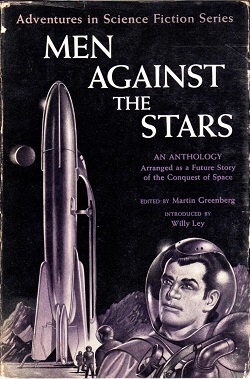
Men Against the Stars is a 1950 anthology of science fiction short stories edited by Martin Greenberg, originally published in hardcover by Gnome Press. A British hardcover was issued by Grayson & Grayson in 1951. Pyramid Books published several abridged paperback versions in the late 1950s and early 1960s.
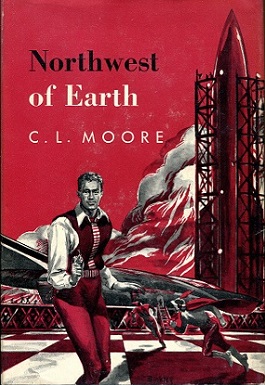
Northwest of Earth is a 1954 collection of science fiction and fantasy short stories by C. L. Moore. It was first published by Gnome Press in 1954 in an edition of 4,000 copies. The collections contains stories about Moore's characters Northwest Smith and Jirel of Joiry. The stories all originally appeared in the magazine Weird Tales.

The Tyrant of Time is a collection of science-fiction short stories by the American writer Lloyd Arthur Eshbach. It was first published by Fantasy Press in 1955 in an edition of 1,547 copies. Most of the stories originally appeared in the magazines Wonder Stories, Amazing Stories, Thrilling Wonder Stories, Science Fiction and Strange Stories.

The Other Place, subtitled "And Other Stories of the Same Sort", is a collection of science fiction and fantasy stories by J. B. Priestley published in hardcover by Harper & Brothers and Heinemann in 1953. The title story, original to the collection, was adapted as an episode of the television series Westinghouse Studio One in 1958, starring Cedric Hardwicke as "a sorcerer with chin whiskers"

















